#russo-ukrainian war
Text

Kreminna forest, Ukraine 2024 (above) and Verdun, France 1918
68 notes
·
View notes
Text
OK, so I've been seeing MULTIPLE posts on my dash about Palestine and I'm thinking, "Yeah, but what about Ukraine? Don't any of us still care about them?" Keep in mind that Russia and Iran are allies.
#Ukraine#Russia#Russian invasion of Ukraine#Russo-Ukrainian War#Volodymyr Zelenskyy#Zelenskyy#Vladimir Putin#Vlad Putin#Putin#Israel#Palestine#Gaza#Israel-Hamas War#Israel-Hamas conflict#Iran#war#conflict#Israel-Palestine conflict#current events#human rights#I personally think that Russia is far more dangerous than Israel but that's just me
22 notes
·
View notes
Text
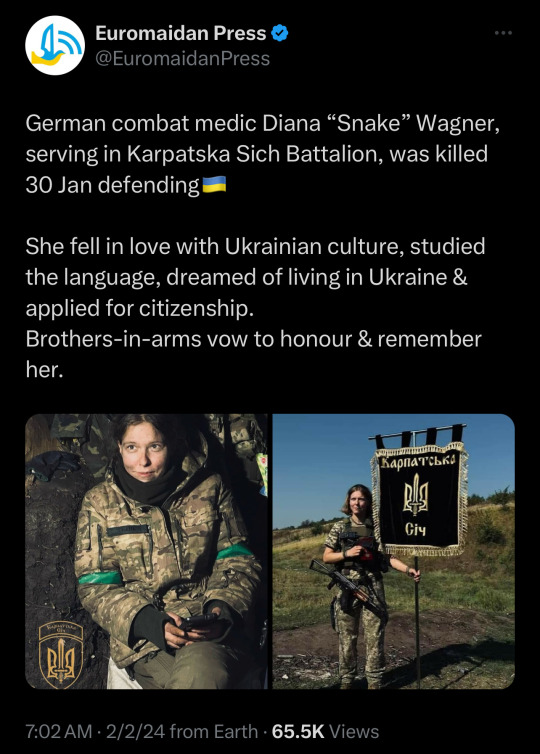
I had the privilege of knowing her since 2017-18. Amazing person. She was so articulate, funny, caring, generous, gracious, and so much more. It hurt deep in my soul hearing the news via her husband. I can’t make it make sense how such pure malice can exist in the world, but Diana persevered her whole life, and was the one light in the darkness that gave you hope. For the good people in your life, it is never “Goodbye,” but “See you later.” Rest easy, Diana. Slava Ukraini.
#russo-ukrainian war#russian invasion of ukraine#combat medic#ukrainian armed forces#tumblr friends#slava ukraini#fuck russia
396 notes
·
View notes
Text
Much of the public discussion of Ukraine reveals a tendency to patronize that country and others that escaped Russian rule. As Toomas Ilves, a former president of Estonia, acidly observed, “When I was at university in the mid-1970s, no one referred to Germany as ‘the former Third Reich.’ And yet today, more than 30 years after the fall of the Berlin Wall, we keep on being referred to as ‘former Soviet bloc countries.’” Tropes about Ukrainian corruption abound, not without reason—but one may also legitimately ask why so many members of Congress enter the House or Senate with modest means and leave as multimillionaires, or why the children of U.S. presidents make fortunes off foreign countries, or, for that matter, why building in New York City is so infernally expensive.
The latest, richest example of Western condescension came in a report by German military intelligence that complains that although the Ukrainians are good students in their training courses, they are not following Western doctrine and, worse, are promoting officers on the basis of combat experience rather than theoretical knowledge. Similar, if less cutting, views have leaked out of the Pentagon.
Criticism by the German military of any country’s combat performance may be taken with a grain of salt. After all, the Bundeswehr has not seen serious combat in nearly eight decades. In Afghanistan, Germany was notorious for having considerably fewer than 10 percent of its thousands of in-country troops outside the wire of its forward operating bases at any time. One might further observe that when, long ago, the German army did fight wars, it, too, tended to promote experienced and successful combat leaders, as wartime armies usually do.
American complaints about the pace of Ukraine’s counteroffensive and its failure to achieve rapid breakthroughs are similarly misplaced. The Ukrainians indeed received a diverse array of tanks and armored vehicles, but they have far less mine-clearing equipment than they need. They tried doing it our way—attempting to pierce dense Russian defenses and break out into open territory—and paid a price. After 10 days they decided to take a different approach, more careful and incremental, and better suited to their own capabilities (particularly their precision long-range weapons) and the challenge they faced. That is, by historical standards, fast adaptation. By contrast, the United States Army took a good four years to develop an operational approach to counterinsurgency in Iraq that yielded success in defeating the remnants of the Baathist regime and al-Qaeda-oriented terrorists.
A besetting sin of big militaries, particularly America’s, is to think that their way is either the best way or the only way. As a result of this assumption, the United States builds inferior, mirror-image militaries in smaller allies facing insurgency or external threat. These forces tend to fail because they are unsuited to their environment or simply lack the resources that the U.S. military possesses in plenty. The Vietnamese and, later, the Afghan armies are good examples of this tendency—and Washington’s postwar bad-mouthing of its slaughtered clients, rather than critical self-examination of what it set them up for, is reprehensible.
The Ukrainians are now fighting a slow, patient war in which they are dismantling Russian artillery, ammunition depots, and command posts without weapons such as American ATACMS and German Taurus missiles that would make this sensible approach faster and more effective. They know far more about fighting Russians than anyone in any Western military knows, and they are experiencing a combat environment that no Western military has encountered since World War II. Modesty, never an American strong suit, is in order.
— Western Diplomats Need to Stop Whining About Ukraine
#eliot a. cohen#current events#politics#ukrainian politics#american politics#warfare#strategy#tactics#diplomacy#russo-ukrainian war#2022 russian invasion of ukraine#war in afghanistan#vietnam war#ukraine#usa#toomas hendrik ilves
477 notes
·
View notes
Text
On war’s second anniversary, Ukraine’s scientific community mourns lost colleagues
As an expert on river ecosystems with the Institute of Hydrobiology, Shevtsova in the 1970s and ’80s traveled frequently for fieldwork to diverse locales including Poland, Iraq, and Libya—a rare privilege for a Soviet scientist. “She was a tiny woman, but always elegant. She was nicknamed ‘Hummingbird,’” Natalia Shevtsova says. At 75, long past the customary retirement age, Lyudmila Shevtsova joined the ecology faculty at National University of Kyiv-Mohyla Academy. Up until the end, “she was still quite intellectually engaged with students and other faculty members. And so friendly—always smiling,” says ecologist Viktor Karamushka, who chairs the university’s Department of Environmental Studies.
Lyudmila Shevtsova wanted her granddaughters, like their mother, to follow in her footsteps and study hydrobiology. They demurred. “I told her I had another vision for my life,” says Daryna Gulei. But when Gulei, 28, phoned her grandmother on 27 December 2023 to say she would defend her Ph.D. in architecture the next day at Kyiv National University of Construction and Architecture, “She was so happy! She read my dissertation twice, gave me some questions.” Gulei shared the good news of her successful defense the last time they spoke.
On 2 January, Gulei and her husband sped across Kyiv to the apartment building after her mother called to say they’d been hit. Dawn was breaking over a melee of firefighters, paramedics, and shaken residents. “I felt my grandmother close by,” Gulei says, and just then a paramedic emerged from the building carrying Lyudmila Shevtsova. Her body was riddled with shrapnel, and she had lost a lot of blood, but she was still breathing.
Natalia says her mother was fading fast and could not speak. “But it was clear she understood I was alive. I hope that gave her some comfort,” Natalia says. “Then my dear mother turned her head away, and died.”
#current events#science#academia#russo-ukrainian war#2022 russian invasion of ukraine#ukraine#russia#liudmyla shevtsova#volodymyr kozlovskyy#igor galkin
80 notes
·
View notes
Text
Imagine that someone—perhaps a man from Florida, or maybe even a governor of Florida—criticized American support for Ukraine. Imagine that this person dismissed the war between Russia and Ukraine as a purely local matter, of no broader significance. Imagine that this person even told a far-right television personality that “while the U.S. has many vital national interests ... becoming further entangled in a territorial dispute between Ukraine and Russia is not one of them.” How would a Ukrainian respond? More to the point, how would the leader of Ukraine respond?
As it happens, an opportunity to ask that hypothetical question recently availed itself. The chair of the board of directors of The Atlantic, Laurene Powell Jobs; The Atlantic’s editor in chief, Jeffrey Goldberg; and I interviewed President Volodymyr Zelensky several days ago in the presidential palace in Kyiv. In the course of an hour-long conversation, Goldberg asked Zelensky what he would say to someone, perhaps a governor of Florida, who wonders why Americans should help Ukraine.
Zelensky, answering in English, told us that he would respond pragmatically. He didn’t want to appeal to the hearts of Americans, in other words, but to their heads. Were Americans to cut off Ukraine from ammunition and weapons, after all, there would be clear consequences in the real world, first for Ukraine’s neighbors but then for others:
If we will not have enough weapons, that means we will be weak. If we will be weak, they will occupy us. If they occupy us, they will be on the borders of Moldova and they will occupy Moldova. When they have occupied Moldova, they will [travel through] Belarus and they will occupy Latvia, Lithuania, and Estonia. That’s three Baltic countries which are members of NATO. They will occupy them. Of course, [the Balts] are brave people, and they will fight. But they are small. And they don’t have nuclear weapons. So they will be attacked by Russians because that is the policy of Russia, to take back all the countries which have been previously part of the Soviet Union.
And after that, if there were still no further response? Then, he explained, the struggle would continue:
When they will occupy NATO countries, and also be on the borders of Poland and maybe fight with Poland, the question is: Will you send all your soldiers with weapons, all your pilots, all your ships? Will you send tanks and armored vehicles with your young people? Will you do it? Because if you will not do it, you will have no NATO.
At that point, he said, Americans will face a different choice: not politicians deciding whether “to give weapons or not to give weapons” to Ukrainians, but instead, “fathers and mothers” deciding whether to send their children to fight to keep a large part of the planet, filled with America’s allies and most important trading partners, from Russian occupation.
But there would be other consequences too. One of the most horrifying weapons that Russia has used against Ukraine is the Iranian-manufactured Shahed drone, which has no purpose other than to kill civilians. After these drones are used to subdue Ukraine, Zelensky asked, how long would it be before they are used against Israel? If Russia can attack a smaller neighbor with impunity, regimes such as Iran’s are sure to take note. So then the question arises again: “When they will try to occupy Israel, will the United States help Israel? That is the question. Very pragmatic.”
Finally, Zelensky posed a third question. During the war, Ukraine has been attacked by rockets, cruise missiles, ballistic missiles—“not hundreds, but thousands”:
So what will you do when Russia will use rockets to attack your allies, to [attack] civilian people? And what will you do when Russia, after that, if they do not see [opposition] from big countries like the United States? What will you do if they will use rockets on your territory?
And this was his answer: Help us fight them here, help us defeat them here, and you won’t have to fight them anywhere else. Help us preserve some kind of open, normal society, using our soldiers and not your soldiers. That will help you preserve your open, normal society, and that of others too. Help Ukraine fight Russia now so that no one else has to fight Russia later, and so that harder and more painful choices don’t have to be made down the line.
“It’s about nature. It’s about life,” he said. “That’s it.”
#current events#warfare#politics#russian politics#american politics#russo-ukrainian war#2022 russian invasion of ukraine#russia#ukraine#usa#volodymyr zelenskyy#ron desantis#nato
245 notes
·
View notes
Text

417 notes
·
View notes
Text
every time I hear some dumbass on tumblr claim the Ukrainian government is anti-Semitic I want to beat the shit out of them with a chair. but I can’t do that, so let me hit you with some fun facts instead:
prior to the invasion, Ukraine had Europe's fifth largest Jewish population. (x)
prior to the invasion, Ukraine had the world's 11th largest Jewish population. (x)
As You May Have Heard, their current president, Volodymyr Zelenskyy, is both Ukraine’s sixth president and Ukraine’s first Jewish president. for comparison, the US has had 46 presidents and Biden is our second Catholic.
Ukraine has had a total of 16 Prime Ministers (not including 2 acting PMs), 2 of which have been Jewish: Volodymyr Groysman and Yukhym Zvyahilsky. (x)
in 2014, the governor of Dnipropetrovsk Oblast, Ihor Kolomoyskyi, and the Ukrainian Speaker of Parliament, Groysman mentioned above, were both Jewish. (x) (x) btw, you’ll notice Putin features a lot in these articles...
this makes Ukraine the world’s first country aside from Israel to simultaneously have a Jewish head of state and a Jewish head of government. super neat!!!! (x)
Ukraine's Jewish population is majority Haredi and Orthodox. Hasidic Judaism actually originated in Ukraine. (x)
also of Ukraine's cities, the ones with the biggest Jewish population aside from Kyiv? Dnipro, Kharkiv, and Odessa. (x) go see what Russia has done to those cities. just go see.
not to seem like I’m pushing an agenda or anything* but maybe Vladimir ‘openly cites Stalin as inspiration’ Putin perhaps is not your best source of information?
#ukraine#russo-ukrainian war#russian invasion of ukraine#russo ukraine war#volodymyr zelensky#volodymyr zelenskyy#russia-ukraine war#antisemitism#*i am. i'm 100% pushing an agenda. support ukraine!
515 notes
·
View notes
Text

Yesterday was the Day of the National Flag and today is the Independence Day of Ukraine.
Victory and peace to those of us who are alive on this day. Eternal glory to the heroes who died for us, our freedom and our home. We will not forget all those who have been killed. We will not forget who killed them, and we will never forgive it.
Be safe (as safe as you can be) and take care of yourself. Слава Україні.
#Ukraine#The Independence Day of Ukraine#russo-Ukrainian war#obligatory FUCK YOU rUSSIA of course#russia is a terrorist state#my art
108 notes
·
View notes
Text
"PSYCHEDELIC SOLDIER"
«Психоделический солдат»
by SHERMAN DROZD [2022]
A Ukrainian-made, DIY synthesizer made from a reclaimed burnt-out tank headlight from the Russian war on Ukraine.
#sherman drozd#synthesizer#DIY#innovation#technology#contemporary art#russo-ukrainian war#ukrainian#music#video#u
34 notes
·
View notes
Text
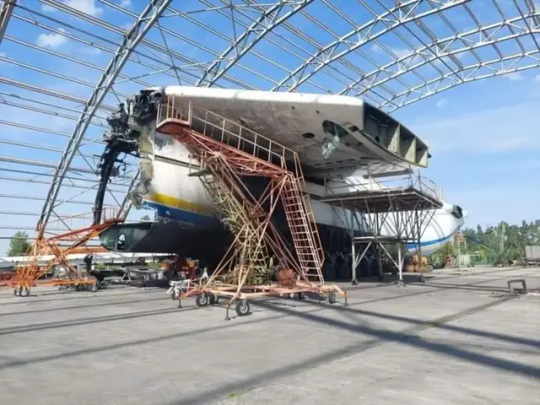
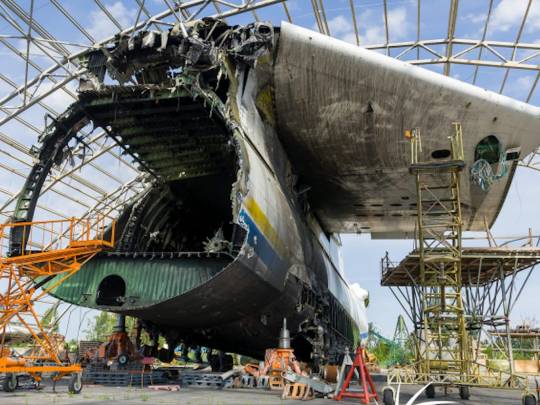

"Recent images of the sole An-225 Mriya show the aircraft being dismantled, reportedly for storage and eventual repair.


"The deputy CEO of Antonov, Maksym Sanotskyi, told the German media outlet Deutsche Welle in April 2023 that three of the An-225's six engines were repaired, and two went to the An-124 fleet as spares — something particularly helpful to Ukraine in the ongoing war effort."
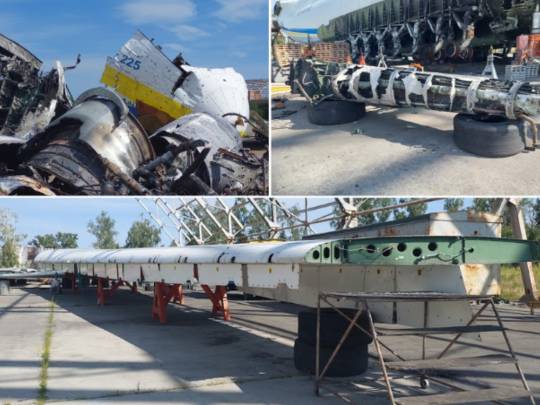
At the time, Antonov said there was 'about 30% of components that can be used for the second sample.'
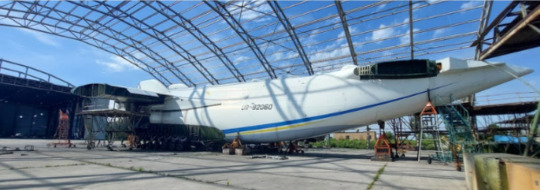
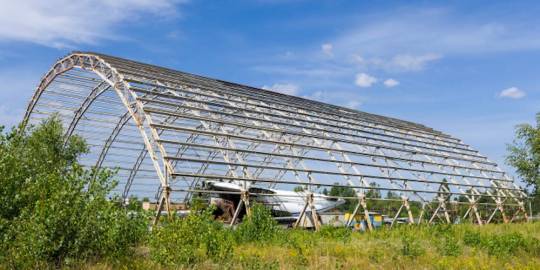
CNN reported Antonov was trying to restore one of the wings, while the Times reported the company was in talks with aviation companies in Europe, the US, and Asia.
'The aircraft will be equipped with modernized engines,' Valerii Kostiuk, an Antonov designer, told CNN in April. 'New electronic on-board equipment will be installed on the plane. Well-known companies will be involved.'
Photo: Igor Lesiv"
Date: August 10, 2023
source, source
#Antonov An-225 Mriya#AN-225#Cargo Plane#Antonov Airlines#Battle of Antonov Airport#Russian invasion of Ukraine#Russo-Ukrainian War#August#2023#my post
39 notes
·
View notes
Text
Montage by the Ukrainian Company Group Team on the border with the Russian Belgorod region.
38 notes
·
View notes
Text
Like I mentioned in my last post, I tend not to dwell on politics much, but I accidentally came across an article in Politico about the history of Russian colonialism in Alaska, and just when I thought I couldn't hate Putin any more...ooh boy. Read it here.
#Russia#Ukraine#Vladimir Putin#Volodymyr Zelenskyy#Putin#Zelenskyy#Russo-Ukrainian War#Russian invasion of Ukraine#Russian terrorism#Russian war crimes#Russian imperialism#Alaska#Russian colonialism#colonialism#imperialism#how anybody can honestly support Russia today is beyond me
113 notes
·
View notes
Text

This was my friend. This is what she stood for and defended, not because of politics or for personal gain, but because it was the right thing to do. Because there is a price for vigilance and the defense of liberty, a price she, and many of her brothers in arms, would end up paying.
You will be in my memory forever, Diana. You will always be someone I can say, with no doubt, that you were the ultimate badass, and that I was proud to know you, even in this little corner of the online world. Slava Ukraini
And for those not in the know or who are on the fence about supporting Ukraine, consider this: If we do not help them defeat this existential threat to democracy, then it will be our daughters and our sons sharing these same front lines, and they will be the ones returning home in a flag-draped casket.
280 notes
·
View notes
Text
In the terrible winter of 1932–33, brigades of Communist Party activists went house to house in the Ukrainian countryside, looking for food. The brigades were from Moscow, Kyiv, and Kharkiv, as well as villages down the road. They dug up gardens, broke open walls, and used long rods to poke up chimneys, searching for hidden grain. They watched for smoke coming from chimneys, because that might mean a family had hidden flour and was baking bread. They led away farm animals and confiscated tomato seedlings. After they left, Ukrainian peasants, deprived of food, ate rats, frogs, and boiled grass. They gnawed on tree bark and leather. Many resorted to cannibalism to stay alive. Some 4 million died of starvation.
At the time, the activists felt no guilt. Soviet propaganda had repeatedly told them that supposedly wealthy peasants, whom they called kulaks, were saboteurs and enemies—rich, stubborn landowners who were preventing the Soviet proletariat from achieving the utopia that its leaders had promised. The kulaks should be swept away, crushed like parasites or flies. Their food should be given to the workers in the cities, who deserved it more than they did. Years later, the Ukrainian-born Soviet defector Viktor Kravchenko wrote about what it was like to be part of one of those brigades. “To spare yourself mental agony you veil unpleasant truths from view by half-closing your eyes—and your mind,” he explained. “You make panicky excuses and shrug off knowledge with words like exaggeration and hysteria.”
He also described how political jargon and euphemisms helped camouflage the reality of what they were doing. His team spoke of the “peasant front” and the “kulak menace,” “village socialism” and “class resistance,” to avoid giving humanity to the people whose food they were stealing. Lev Kopelev, another Soviet writer who as a young man had served in an activist brigade in the countryside (later he spent years in the Gulag), had very similar reflections. He too had found that clichés and ideological language helped him hide what he was doing, even from himself:
I persuaded myself, explained to myself. I mustn’t give in to debilitating pity. We were realizing historical necessity. We were performing our revolutionary duty. We were obtaining grain for the socialist fatherland. For the five-year plan.
There was no need to feel sympathy for the peasants. They did not deserve to exist. Their rural riches would soon be the property of all.
But the kulaks were not rich; they were starving. The countryside was not wealthy; it was a wasteland. This is how Kravchenko described it in his memoirs, written many years later:
Large quantities of implements and machinery, which had once been cared for like so many jewels by their private owners, now lay scattered under the open skies, dirty, rusting and out of repair. Emaciated cows and horses, crusted with manure, wandered through the yard. Chickens, geese and ducks were digging in flocks in the unthreshed grain.
That reality, a reality he had seen with his own eyes, was strong enough to remain in his memory. But at the time he experienced it, he was able to convince himself of the opposite. Vasily Grossman, another Soviet writer, gives these words to a character in his novel Everything Flows:
I’m no longer under a spell, I can see now that the kulaks were human beings. But why was my heart so frozen at the time? When such terrible things were being done, when such suffering was going on all around me? And the truth is that I truly didn’t think of them as human beings. “They’re not human beings, they’re kulak trash”—that’s what I heard again and again, that’s what everyone kept repeating.
— Ukraine and the Words That Lead to Mass Murder
#anne applebaum#ukraine and the words that lead to mass murder#current events#history#politics#russian politics#sociology#psychology#communism#warfare#totalitarianism#propaganda#holodomor#russo-ukrainian war#2022 russian invasion of ukraine#russia#ukraine#viktor kravchenko#lev kopelev#vasily grossman#kulaks
263 notes
·
View notes
Photo
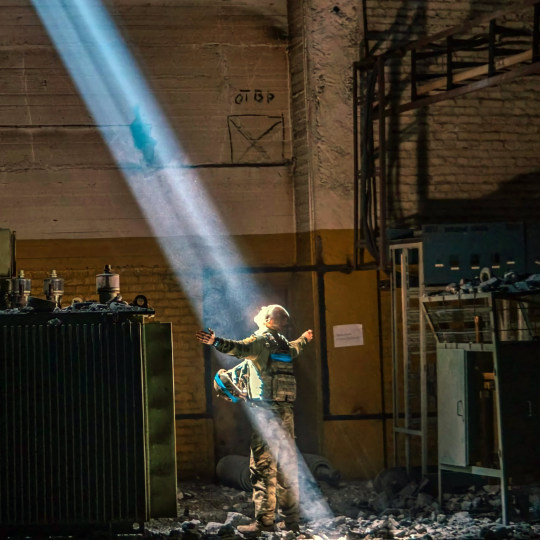
Ukrainian defender at Azovstahl.
#ukraine#mariupol#azov#azovstal#azovstahl#steel balls#russo-ukrainian war#steelworks#steel plant#life#light#warriors of light
484 notes
·
View notes